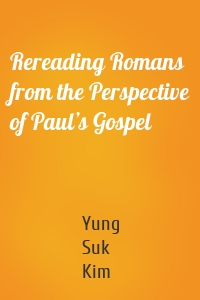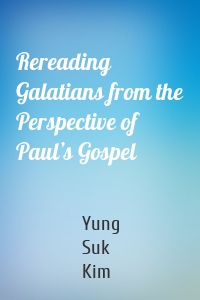Yung Suk Kim
8 кн.
Jesus’s Truth
Parables of Jesus are stories about everyday life, ranging from a person's worldview to economic justice in society. This book examines most parables of Jesus from a critical literary perspective. Twenty-three narrative parables in the Synoptic Gospels are rearranged by their source: Markan parables, Q parables, Matthean unique parables, Lukan unique parables. Each parable invites readers to reengage Jesus's stories in the contemporary world.
| Автор | Yung Suk Kim |
Reading Jesus’ Parables with Dao De...
Dao De Jing is an ancient wisdom book, purportedly written by Laozi, who flourished in the sixth century BCE according to the Chinese tradition. It is comprised of eighty-one short poems of which the source is diverse, ranging from personal life to communal and political life. It uses abundant metaphors taken from nature such as water, dust, river, wood, and valley. Laozi reminds his readers to rethink their worldview and purpose of life. Parables of Jesus also are stories about life, ranging...
| Автор | Yung Suk Kim |
Toward Decentering the New Testamen...
Toward Decentering the New Testament is the first introductory text to the New Testament written by an African American woman biblical scholar and an Asian-American male biblical scholar. This text privileges the voices, scholarship, and concerns of minoritized nonwhite peoples and communities. It is written from the perspectives of minoritized voices. The first few chapters cover issues such as biblical interpretation, immigration, Roman slavery, intersectionality, and other topics. Questions...
| Автор | Yung Suk Kim |
Rereading Romans from the Perspecti...
Paul did not write a systematic theology or specific church doctrines when he wrote Romans. His audience was Roman Christians, and his last will was to preach the gospel to all, especially gentiles in Spain. Through this letter, Paul wants to pave the way for a visit to Rome and expects their support on his mission trip to Spain. The question is this: What kind of the gospel does he want to share with them? Traditionally, the letter has been read from the perspective of forensic salvation that...
| Автор | Yung Suk Kim |
Rereading Galatians from the Perspe...
Galatians has often been read from a rhetorical perspective, with an emphasis on justification by faith, Paul's autobiographical experience, proofs of the gospel, and exhortations to the Galatians. However, it can be read as a «letter» of which the main theme is the gospel–an umbrella term that covers many other topics, including faith, righteousness, freedom, and new creation. Paul writes Galatians not to argue for an individual justification by faith (understood from a forensic salvation...
| Автор | Yung Suk Kim |
Preaching the New Testament Again
This book combines critical New Testament scholarship with homiletic concerns. Kim unravels complexities of the most prominent themes in the New Testament such as faith, freedom, and transformation, and brings them into dialogue with modern preaching contexts, ranging from personal identity to social justice to global issues. This book invites readers to reinterpret the most familiar themes that have not been thoroughly explored in scholarship and to make an informed choice about what to preach...
| Автор | Yung Suk Kim |
A Theological Introduction to Paul’...
In this study Kim explores a new way of reading Paul's letters and understanding his theology with a focus on three aspects of Paul's gospel: «the righteousness of God,» «faith of Christ,» and «the body of Christ.» Kim argues that Paul's thought can be best understood by reading these genitives as the subjective or attributive genitives, rather than as the objective genitives. The subjective or attributive reading places an emphasis on the subject's participation: God's...
| Автор | Yung Suk Kim |
Biblical Interpretation
Yung Suk Kim asks important questions in Biblical Interpretation: Why do we care about the Bible and biblical interpretation? How do we know which interpretation is better? He expertly brings to the fore the essential elements of interpretation–the reader, the text, and the reading lens–and attempts to explore a set of criteria for solid interpretation. While celebrating the diversity of biblical interpretation, Kim warns that not all interpretations are valid, legitimate, or healthy because...
| Автор | Yung Suk Kim |









